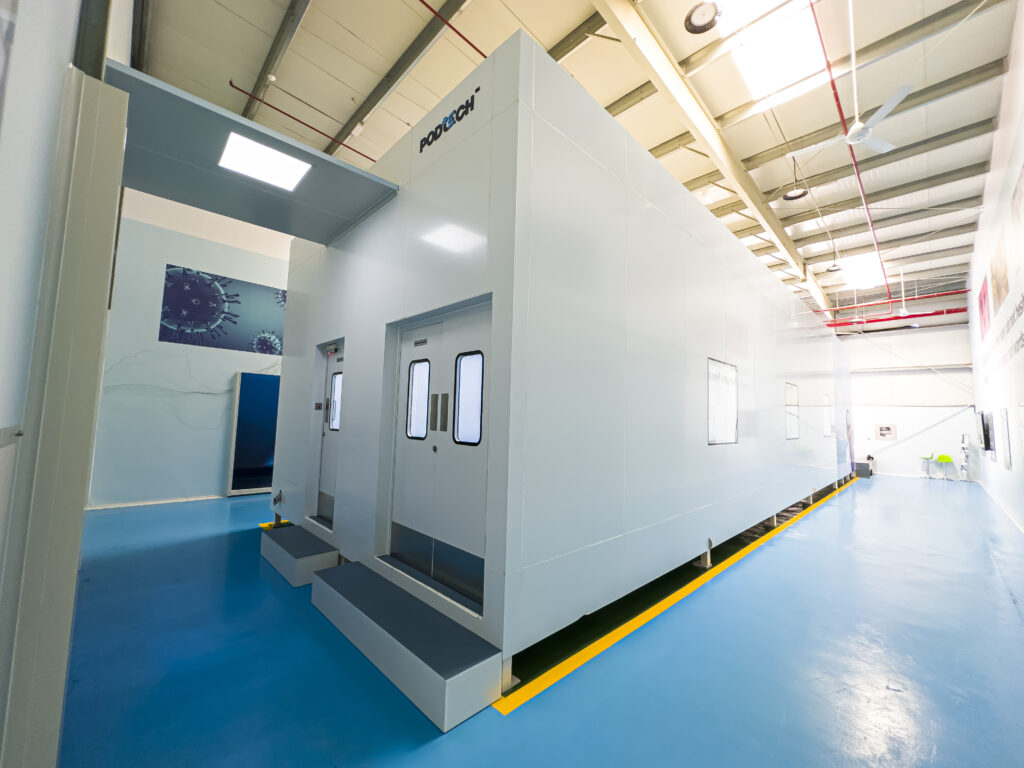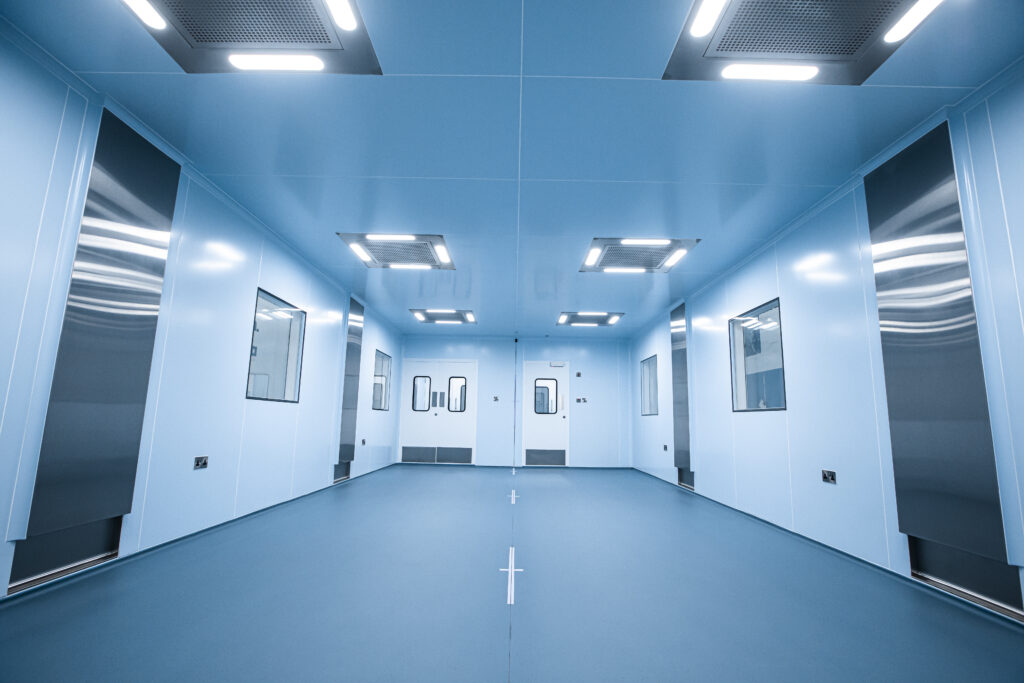In this edition of the inConversation series by Hello Pharma, we sit down with Mr. Aasif Ahsan Khan, the Founder of PodTech Lifecare and G7 Universal, and Chairman of Fabtech Technologies. Mr. Khan shares his insights on the ground-breaking PodTech™ modular biopharma solutions, which are set to revolutionize global healthcare by offering fast, flexible, and scalable manufacturing infrastructure, especially in regions where biopharma capabilities are still developing.
Can you tell us a bit about PodTech™ and the origin of this concept?
Twenty-five years ago, I founded Fabtech Technologies with a vision to engineer solutions for the global pharma and healthcare industry. Today, we’ve grown into a company with a global footprint, having commissioned projects in 62 countries and delivering turnkey solutions across six continents. This journey has given us a unique perspective on the world’s healthcare disparities.
While we’ve successfully helped establish pharmaceutical manufacturing in numerous countries, the challenges faced by regions with limited infrastructure are stark. The dream of affordable, accessible medicine for all often hinges on the availability of basic manufacturing capabilities.
That’s where the idea for PodTech™ was seeded. Our vision with PodTech™ is to offer fast, flexible and scalable solutions for biopharma capability building, especially in regions that need to build up their healthcare infrastructure quickly.

PodTech™ builds podules™, which are pre-fabricated, self-contained factory units which are manufactured offsite and then shipped to the desired location, where they are simply assembled. So when there’s a public health emergency somewhere, or a country has been dealing with a massive burden of a particular disease, podules™ can be deployed there fairly quickly. They can be designed to manufacture diagnostics or medicines, they can be used to make vaccines or gene therapies. podules™ can also be used as labs for testing, for patient recovery – pretty much any cleanroom application you can think of.
How significant are the claimed time and cost savings with PodTech™? How does the process minimize disruption to ongoing operations?
The savings on time and cost are quite significant with PodTech™’s podules™. If you want to set up a traditional factory system, you can easily take a few years to get the whole thing built and operational. We’ve found that comparatively, podules™ take about half as much time to get up and running.

As for costs, too, pharma manufacturers can save a lot by deploying podules™ instead of traditional construction. You see, a traditional setup needs extensive on-site construction – this takes a lot of time, a lot of manpower, and you will likely have to press pause on any existing operations at your site.
On the other hand, podules™ are manufactured entirely off-site, at our facility in the UAE. At your project site, we only assemble the pods and connect them to basic utilities – “plug and play”, we call it. The podules™ are pre-validated before we ship them, so you don’t need to delay operations waiting to meet regulatory requirements. The relatively simple assembly process doesn’t require that you stop ongoing operations. And the podules™ are also self-supporting, which means that they don’t need structural support from any existing buildings. On the whole, this leads to major cost savings.
Beyond speed and cost savings, what are the key advantages of this modular approach for biopharmaceutical companies? Does it offer flexibility in terms of production capacity or the types of products that can be manufactured?
Flexibility, absolutely. The podules™ are modular, so you can just add on extra podules™ to ramp up production capacity when needed. Some smaller factory systems can be mounted on a plinth and wheels and be relocated. Pharma companies, especially in regions without developed pharma markets, often deal with market fluctuations. This is particularly true when there is a public health emergency that must be responded to quickly. That’s where this flexibility is a game changer.
This same flexibility and scalability also ensure that our podules™ can be used to manufacture a diverse portfolio of products. Oncology drugs, inhalation therapies, APIs, fill and finish – you name it and PodTech™ can help you make it.
PodTech™ is touted as empowering regions lacking biopharma infrastructure to achieve self-sufficiency. How can this technology help these regions participate in the global pharmaceutical market?
One of the biggest reasons holding some regions back in the biopharma market is the lack of infrastructure and technological capability. These regions rely largely on imports for their drugs, vaccines and diagnostics, which is a recipe for dependence and volatility. We saw this during the Covid-19 pandemic – pharma manufacturing powerhouses shut their borders or limited exports. What are countries without local production capabilities to do in such situations?
Becoming self-sufficient in biopharma manufacturing is the only way to ensure healthcare security in your country or region. One, it will give you a say in the supply of medicines, vaccines, etc. that your population needs – you don’t have to shell out large amounts of money to import essential health products or be at the mercy of countries from where you procure these essentials. And two, not only do you get to participate more actively in the global pharma market but you also strengthen your own economy by creating jobs, improving public health outcomes and possibly even exporting the products you make.
Biopharmaceutical production is complex, requiring stringent quality control and regulatory compliance. How does this modular system address these complexities and ensure adherence to regulations?
Pharma manufacturers can rest assured about regulatory compliance when they use PodTech™’s factory systems. Our podules™ have the necessary systems and safety controls in place – fire protection, air handling, building management systems, etc. Each of our podules™ is rigorously tested and validated before it leaves our manufacturing facility. This means that compliance with regulatory standards is guaranteed on our end.
We’ve made it our mission to bring this modular biopharma infrastructure to every underserved region in the world. But this tech is already common in the West, so it is already recognised and approved by the US FDA, MHRA UK and EU GMP. A lot of Covid-19 vaccines in the US were made in pre-fabricated modular systems such as ours, so the system is tried and tested for large-scale biopharma production. Quality control and compliance are no more difficult with podules™ than they are with traditional biopharma factories.
The system offers technology licensing and partnerships for downstream processing and specialized products. What expertise do these partnerships bring to the table, and how does this collaboration impact the overall accessibility of biopharma production?
While physical infrastructure is a major barrier for countries looking to manufacture pharmaceuticals locally, it’s not the only challenge. Regional manufacturers also need technological know-how and a skilled workforce to execute their projects.
The technology licenses and sharing options that we provide help plug this gap. They help new manufacturers to connect with established manufacturers from around the world. The new manufacturers can then access their extensive knowledge and experience in biopharma production – for oncology treatments, inhalation therapies and other specialised products. They can get access to the latest technologies and processes through these licensing agreements. They get to train and upskill their local workforce to adopt advanced biopharma techniques. And they can meet high international standards – this quality assurance also makes them more competitive in the global market.
Overall, the benefits of these tech partnerships are unparalleled in terms of cost savings, time to market, quality assurance and local capability building.
Faster response to public health emergencies is a significant benefit highlighted. Can you elaborate on how this system can expedite vaccine or drug production during outbreaks?
Let me give you an example. During Covid, we needed to manufacture new vaccines, based on a new immunisation approach, at very large scales and an unprecedented rate. Modular systems were a lifesaver. Pfizer installed some 13,000 square feet of modular rooms to rapidly scale up their capacity. With this upgrade, the Pfizer-BioNTech partnership went from producing 3-4 million vaccine doses weekly to 13 million doses weekly.
If we can do this for Covid, we can do it for the many outbreaks that occur in Africa, South America or anywhere else in the world. We have the technology for it; we just need to get busier putting it to good use.
Job creation and a more resilient healthcare system are also mentioned as economic benefits. Can you throw some light on the potential long-term economic impact of this technology in developing regions?
When you set up local manufacturing, jobs are created along the entire value chain of your product. Prefabricated systems may need less manpower for installation, but they certainly need people to manufacture the podules. When they are delivered to the project site, they employ people for installation. Once operational, they create operations and maintenance jobs.
Local pharmaceutical manufacturing stimulates the development of the entire industrial ecosystem. It encourages the development of related industries like logistics, packaging, raw material supply and the like. This, in turn, creates a favourable environment for industry as a whole. It gives investors confidence to commit their resources to regions that have such established infrastructure.
Not to mention the additional economic advantages like an improvement in the import-export balance and better productivity because you have a healthier workforce.
While the focus is on advantages, are there any potential drawbacks to consider? For example, are there limitations in the scale of production compared to traditional facilities?
No good thing is free of some challenges. But we approach these challenges as opportunities to fine-tune our offerings and build our capabilities.
On the technical front, largely, we’re very adaptable and can customise factory design to customer requirements. But sometimes, if there are highly specialised or non-standard requirements, developing the right design becomes a bit more complex. Sometimes, a modular system may have some space limitations, making it difficult to accommodate large equipment within the layout.
With creativity, research and diligence, PodTech™’s teams are quite adept at coming up with solutions. So our real challenge now is to address the market perception of modular factory systems. Some pharma manufacturers assume that pre-fabricated systems are less robust or reliable. But that is absolutely not true.
Modular construction is not a new concept, and over the years, technology and design have advanced so much that pre-fabricated structures today are extremely strong and effective. In fact, they are also resilient to harsh weather conditions, which older traditional factories may not be.
With the work we’ve done so far, we are demonstrating the effectiveness and reliability of our podules™. We hope to build greater trust in modular construction technology so that we can accelerate our mission to make medicine affordable and accessible to every person in the world.






